12 Best crm software for nonprofits You Should Know
Discover the top 12 best crm software for nonprofits strategies and tips. Complete guide with actionable insights.
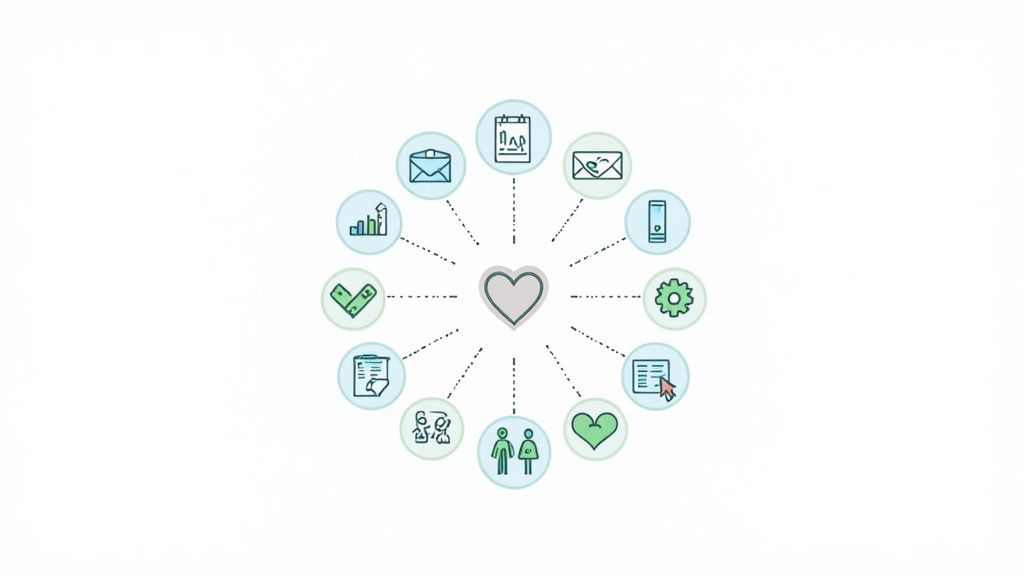
Managing donor relationships, tracking fundraising campaigns, and coordinating volunteer efforts are central to any nonprofit's mission. Without the right tools, these critical tasks can become a tangled mess of spreadsheets and disparate data, hindering your organization's impact. The right Constituent Relationship Management (CRM) system centralizes this information, providing a single source of truth for all your stakeholder interactions. This transition is key to scaling your operations and deepening community engagement.
Finding the best CRM software for nonprofits means identifying a platform that aligns with your specific operational needs, from grant management to event planning. This comprehensive guide is designed to simplify your search. We will dive deep into the top platforms, moving beyond marketing claims to offer a practical analysis of their core functionalities, pricing structures, and ideal use cases. Each review includes an honest look at potential limitations, screenshots of the user interface, and direct links to help you evaluate each option thoroughly.
This resource will help you:
- Compare leading nonprofit CRMs side-by-side.
- Understand specific features for fundraising, donor management, and program tracking.
- Identify which platform best fits your organization's size, budget, and technical resources.
1. Salesforce Nonprofit Cloud
Salesforce Nonprofit Cloud is a titan in the CRM world, offering a purpose-built solution that handles everything from fundraising and grant lifecycle management to program delivery and volunteer coordination. It stands out for its enterprise-grade power and unmatched customization, making it one of the best CRM software for nonprofits that anticipate significant growth or have complex operational needs. The platform's core strength lies in its extensible data model, allowing organizations to track unique metrics and build sophisticated, automated workflows.
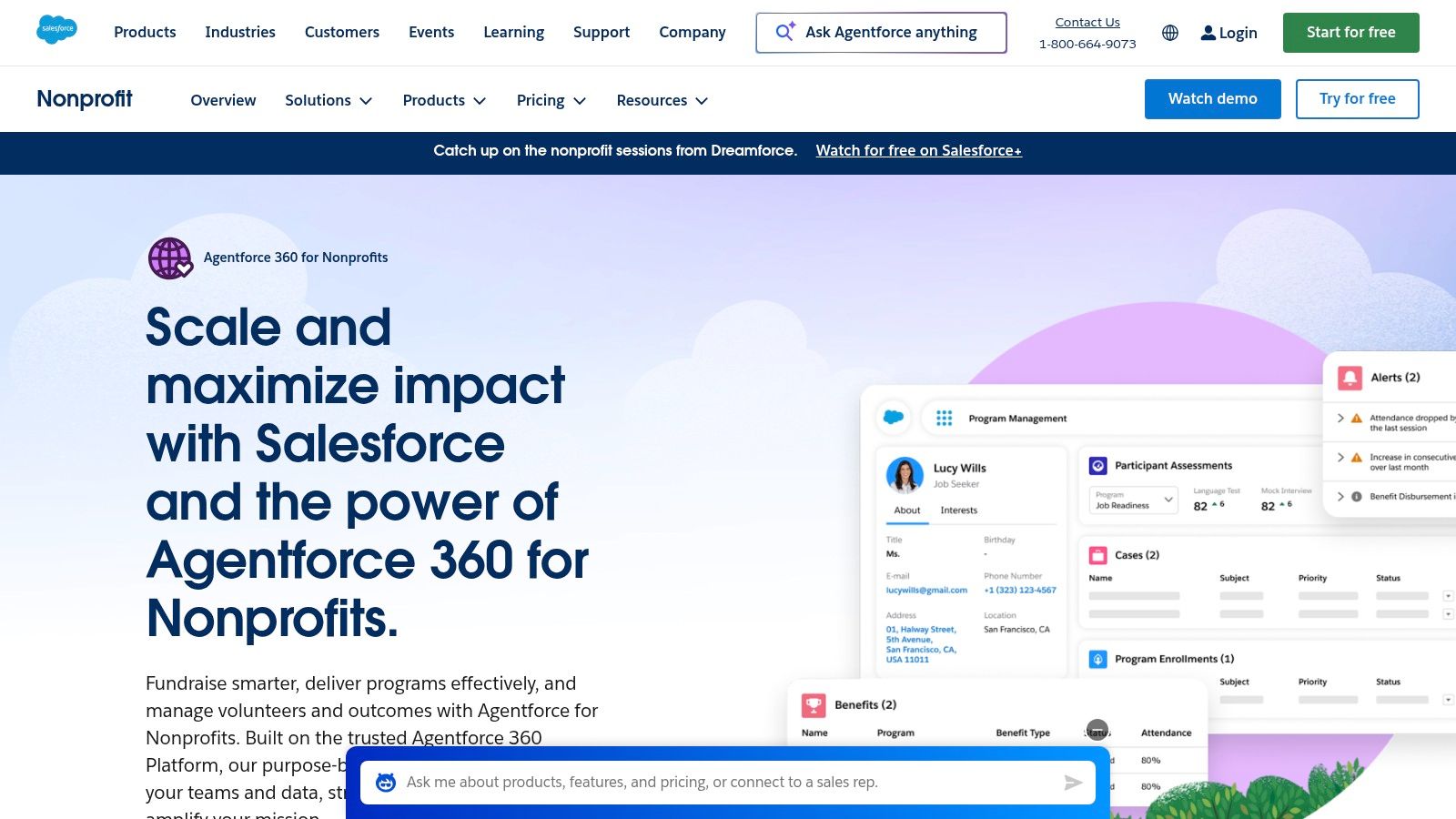
Key Features & Considerations
- Pricing: Eligible nonprofits can apply for the Power of Us Program, which includes 10 free Enterprise Edition licenses. Additional licenses and more advanced products come at a significant discount.
- Best For: Mid-sized to large nonprofits needing a single, scalable platform to manage complex fundraising, programs, and marketing automation.
- Implementation: The platform's complexity often requires a certified implementation partner or a dedicated, trained administrator to configure it properly. This initial investment in time and resources is a critical consideration.
- Ecosystem: The Salesforce AppExchange provides access to thousands of third-party apps, allowing you to extend functionality for things like event management, advocacy, or payment processing.
Website: https://www.salesforce.com/nonprofit/
2. Microsoft Dynamics 365 for Nonprofits (Microsoft Cloud for Nonprofit)
Microsoft Cloud for Nonprofit offers a powerful, integrated suite of tools built upon the Dynamics 365 and Power Platform foundations. It excels at unifying data across fundraising, volunteer management, and program delivery, making it one of the best CRM software for nonprofits already invested in the Microsoft ecosystem. Its key differentiator is the deep, native integration with Microsoft 365, Power BI, and emerging AI tools like Copilot, allowing for streamlined workflows and sophisticated data analysis directly within familiar applications. This platform is designed for organizations seeking enterprise-level control and extensive customization.
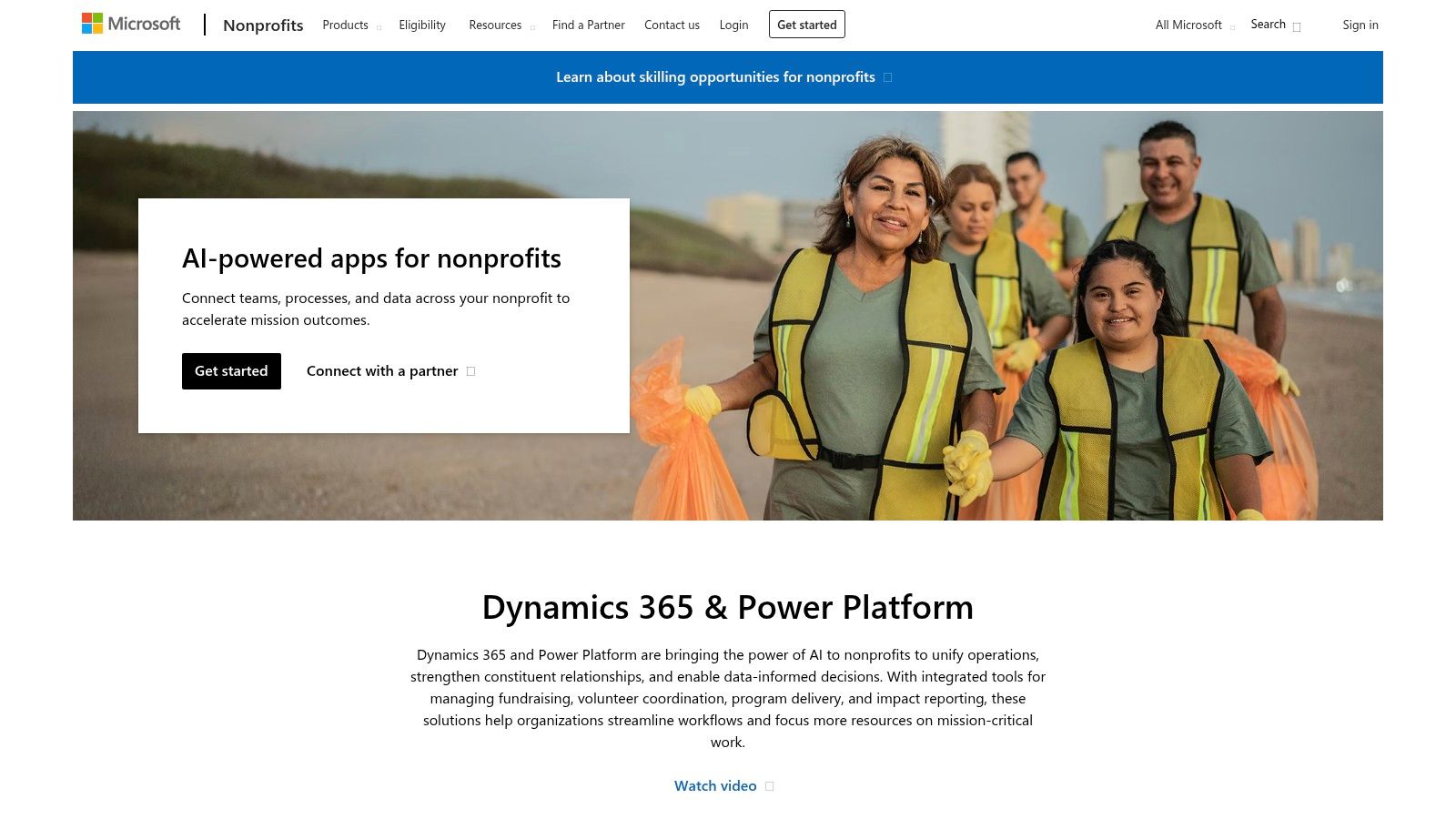
Key Features & Considerations
- Pricing: Microsoft provides significant discounts and grants for its cloud services. Nonprofits can apply for these benefits to dramatically lower costs; you can find details in our guide to nonprofit technology grants.
- Best For: Mid-sized to large nonprofits that use Microsoft 365 and want a highly extensible CRM that leverages their existing technology stack.
- Implementation: Similar to Salesforce, achieving a successful implementation often requires working with a certified Microsoft partner to navigate its modular structure and configure the platform.
- Ecosystem: The platform is built on the Power Platform, which allows for extensive automation and custom app development with minimal code, connecting disparate data sources with ease.
Website: https://www.microsoft.com/en-us/nonprofits/dynamics-365
3. HubSpot for Nonprofits
HubSpot is renowned for its powerful inbound marketing and sales tools, and its CRM platform brings that same user-friendly, growth-oriented approach to the nonprofit sector. It excels for organizations that are heavily focused on communications, digital fundraising, and supporter engagement. The platform’s strength lies in its all-in-one nature, seamlessly connecting a free, robust CRM with top-tier marketing, sales, and service hubs, making it one of the best CRM software for nonprofits prioritizing marketing automation and ease of use.
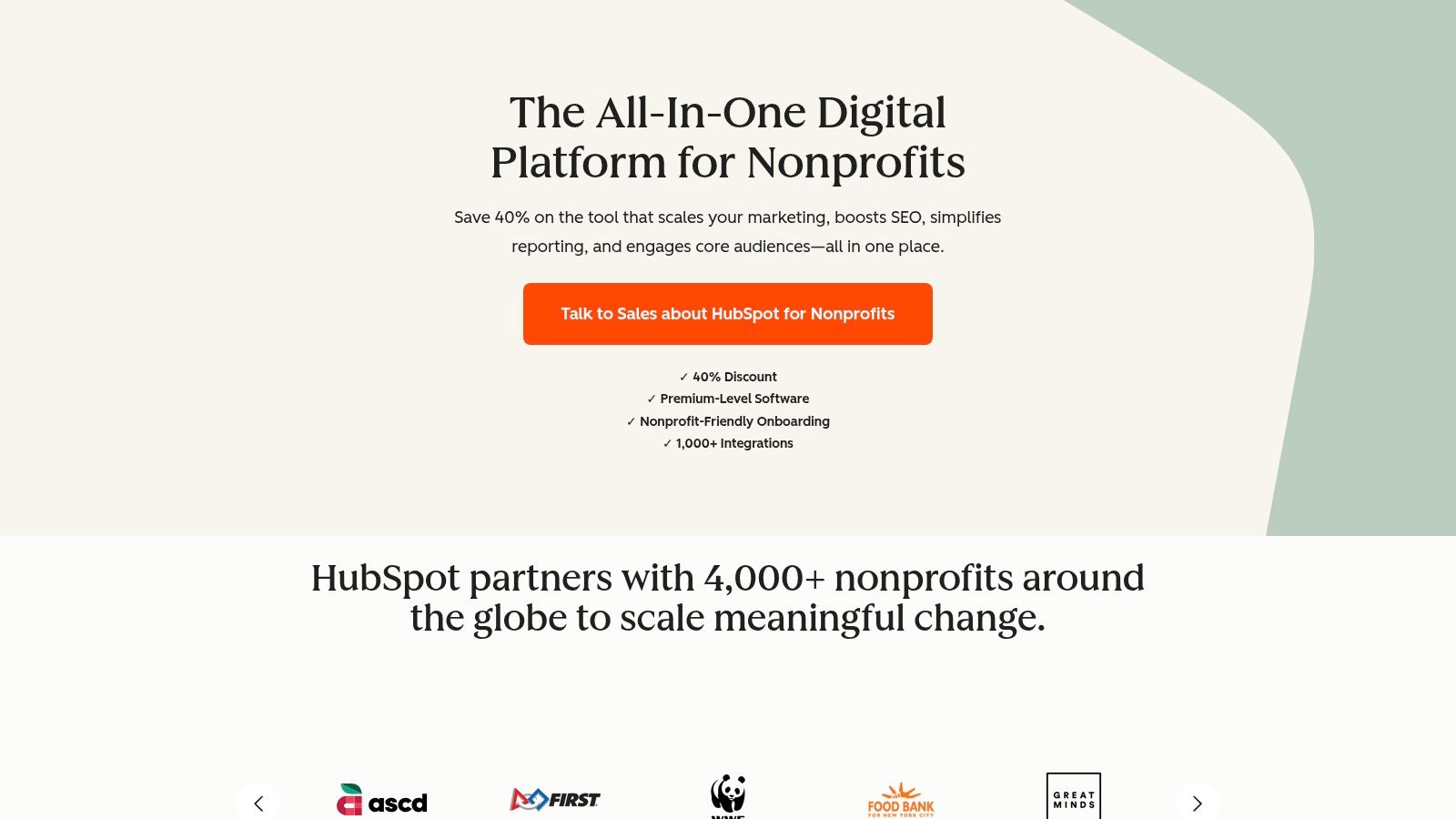
Key Features & Considerations
- Pricing: The core CRM is free. Eligible nonprofits can receive a 40% discount on paid subscriptions for the Marketing, Sales, Service, and CMS Hubs.
- Best For: Nonprofits of all sizes that need powerful, easy-to-use digital marketing, content management, and communication tools integrated directly with their contact database.
- Implementation: HubSpot is known for its intuitive interface and straightforward setup. While it's not a purpose-built donor management system, it can be configured to track donations and grants, often without needing a dedicated consultant.
- Ecosystem: The platform features a large marketplace with over 1,000 integrations, including popular fundraising and payment tools like Stripe, Donorbox, and QuickBooks.
Website: https://www.hubspot.com/nonprofits
4. Bloomerang
Bloomerang is a donor-centric CRM designed from the ground up to help nonprofits improve donor retention and build lasting relationships. Marketed as a comprehensive Giving Platform, it combines a user-friendly CRM with integrated fundraising tools, making it a strong contender for the best CRM software for nonprofits that prioritize an all-in-one, intuitive solution. Its key differentiator is a built-in focus on best practices, with features like a donor engagement meter and predictive analytics that help organizations identify and nurture their most committed supporters.
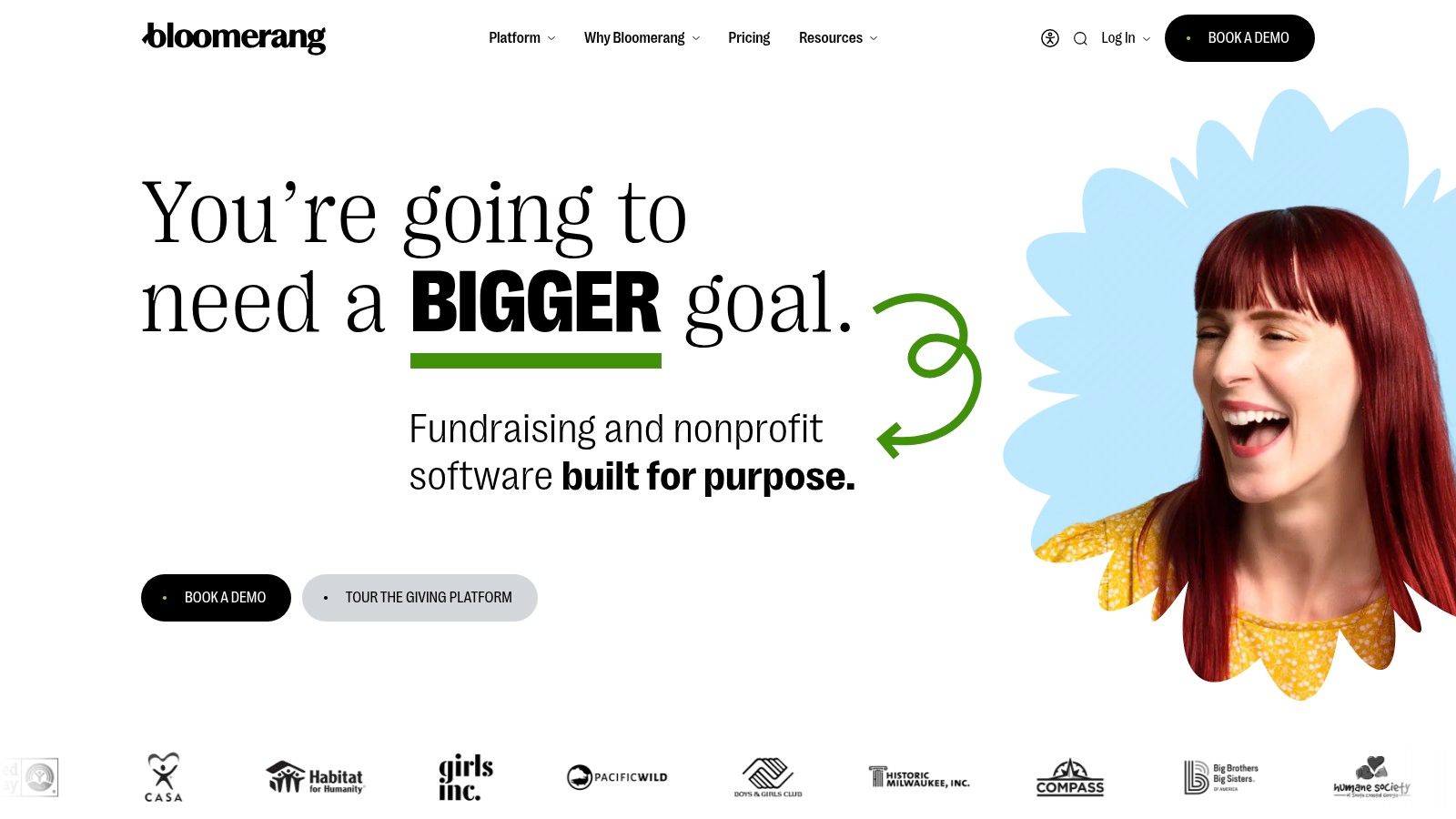
Key Features & Considerations
- Pricing: Offers transparent, product-level pricing based on the number of records. Their "Grow" package includes the core CRM and fundraising tools, while the "Thrive" package adds volunteer management, marketing, and more.
- Best For: Small to mid-sized nonprofits seeking an easy-to-learn, all-in-one platform for donor management and integrated fundraising without the need for extensive technical expertise.
- Implementation: Known for its straightforward setup and excellent customer support, including "Bloomerang Academy" for training. This focus on usability reduces the reliance on outside consultants for most organizations.
- Fundraising Tools: The platform integrates online giving forms, event management, peer-to-peer campaigns, and auctions, which is a great way to implement nonprofit fundraising best practices.
Website: https://bloomerang.com/
5. Neon One – Neon CRM
Neon One positions its Neon CRM as a comprehensive, all-in-one platform designed to help nonprofits grow. It combines donor and grant management with native tools for events, volunteers, email marketing, and online forms, making it a strong contender for organizations seeking to consolidate their tech stack. Its primary appeal lies in its unified toolset, which aims to provide a single source of truth for all constituent engagement, from fundraising campaigns to volunteer coordination.

Key Features & Considerations
- Pricing: Neon CRM offers tiered pricing plans (Essentials, Impact, Empower) based on features and the number of contacts, allowing organizations to scale their investment as they grow.
- Best For: Small to mid-sized nonprofits that want a broad, built-in feature set to manage multiple operational areas without relying on numerous third-party integrations.
- Implementation: The platform is generally more straightforward to set up than enterprise-level systems, but some users report a learning curve for more advanced modules. The tiered plan structure can influence the level of support and automation available.
- Ecosystem: Key integrations include QuickBooks for accounting synchronization and an open API that allows for custom connections to other software, providing a degree of flexibility.
Website: https://neonone.com/solutions/neon-crm-pricing/
6. Blackbaud Raiser’s Edge NXT
Blackbaud Raiser’s Edge NXT is an enterprise-grade fundraising and donor management platform with a long-standing reputation among large-scale nonprofits and educational institutions. It is designed for organizations with complex fundraising operations, offering deep functionality for managing major gifts, planned giving, and multi-channel campaigns. The platform provides a comprehensive view of the entire supporter journey, combining robust data management with powerful analytics to drive strategy.
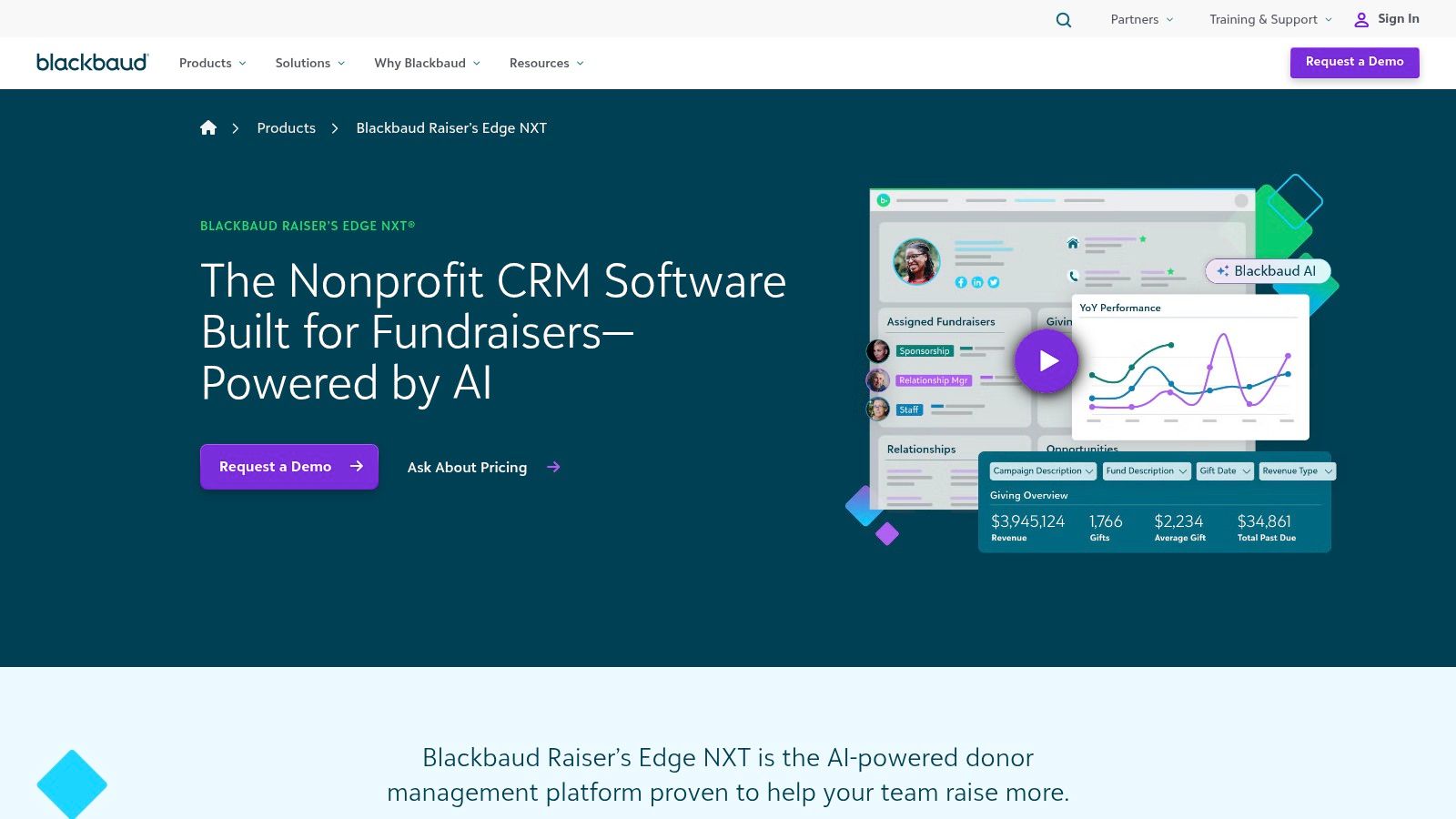
Key Features & Considerations
- Pricing: Pricing is customized based on organizational size and needs. It is generally positioned at the higher end of the market, reflecting its enterprise focus.
- Best For: Large nonprofits, universities, and healthcare foundations that require a specialized, powerful tool for sophisticated fundraising and donor relationship management.
- Implementation: The system's depth often necessitates a guided implementation process with Blackbaud's professional services to ensure it is configured for specific fundraising workflows.
- Ecosystem: Blackbaud offers a large marketplace of integrated solutions and a vast network of partners, providing extensive support, training, and services.
Website: https://www.blackbaud.com/products/blackbaud-raisers-edge-nxt
7. DonorPerfect
DonorPerfect has been a staple in the nonprofit sector for decades, offering a reliable CRM focused squarely on donor management and fundraising. It's often the first step for small to mid-sized organizations graduating from spreadsheets, providing a structured yet accessible platform to manage constituent data. The system shines in its core fundraising capabilities, including integrated online donation forms, automated recurring gift processing, and streamlined acknowledgment workflows, making it a strong contender for the best CRM software for nonprofits prioritizing fundraising efficiency.
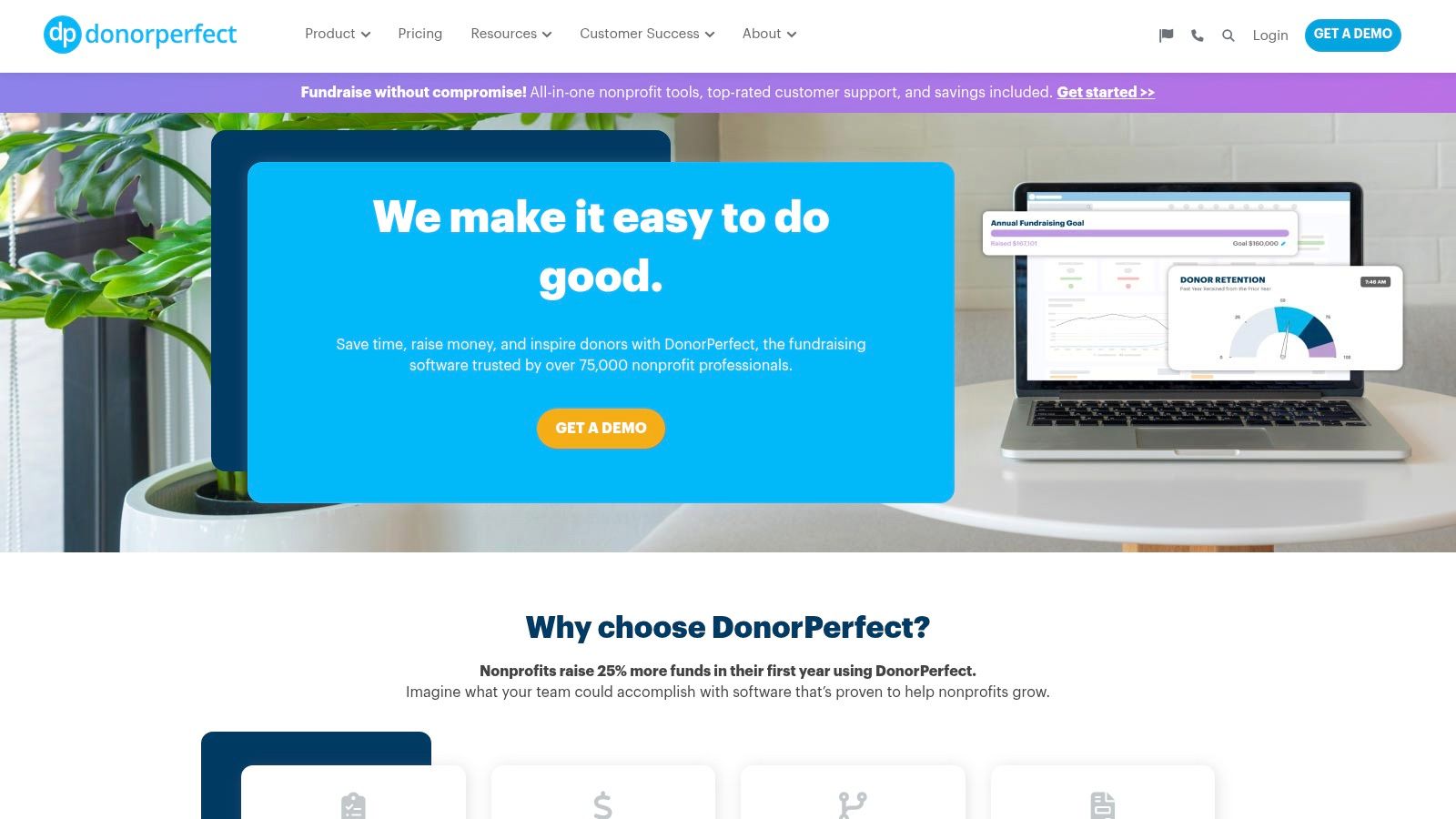
Key Features & Considerations
- Pricing: Quote-based pricing is determined by the number of constituent records. The company often promotes its flexible, month-to-month subscription options without long-term contracts.
- Best For: Small to mid-sized nonprofits that need a dedicated fundraising CRM with a mature feature set and don't want to be locked into a long-term contract.
- Implementation: DonorPerfect offers various onboarding packages and ongoing training webinars. While more straightforward than enterprise systems, optimizing its reporting and interface often requires some initial configuration and learning.
- Ecosystem: A key strength is its large network of integrations, connecting to tools like QuickBooks, Constant Contact, and various platforms for wealth screening, auctions, and payment processing.
Website: https://www.donorperfect.com/
8. Little Green Light (LGL)
Little Green Light is a highly regarded donor management CRM known for its straightforward functionality and transparent, affordable pricing. It prioritizes the core needs of small to mid-sized nonprofits, offering robust tools for constituent tracking, donation processing, and fundraising campaigns without overwhelming users with unnecessary complexity. The platform stands out by providing unlimited user accounts at every pricing tier, making it one of the best CRM software for nonprofits that are budget-conscious and value collaborative team access.
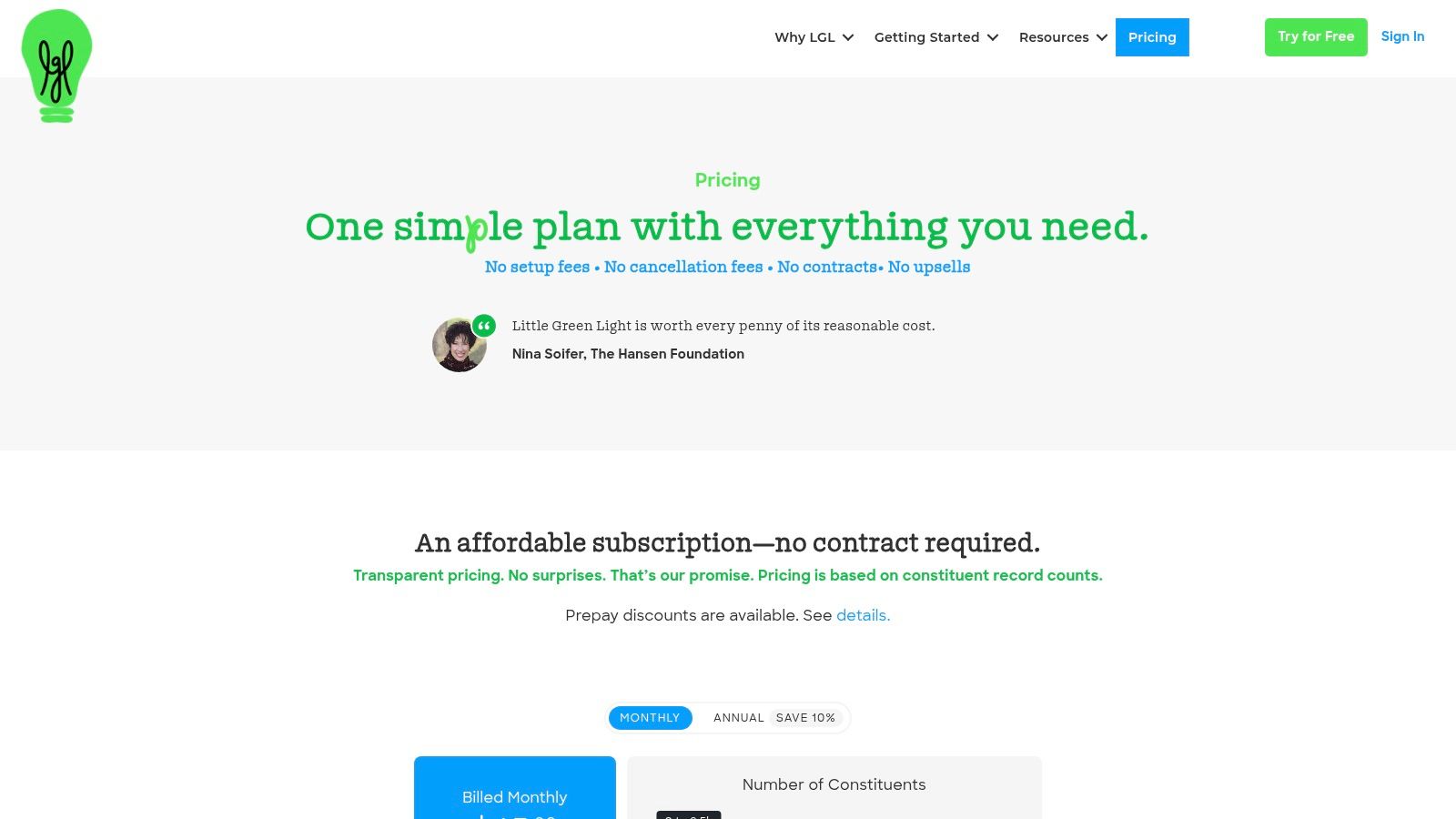
Key Features & Considerations
- Pricing: Based on the number of constituent records, starting at a very accessible price point. All plans include unlimited users, a 30-day free trial, and no setup fees.
- Best For: Small and growing nonprofits that need an easy-to-use, all-in-one donor management system with predictable costs and excellent customer support.
- Implementation: LGL is designed for self-starters. Its intuitive interface and extensive knowledge base mean most organizations can get up and running quickly without needing to hire an outside consultant.
- Ecosystem: Offers direct integrations with key services like Mailchimp, QuickBooks, Stripe, and PayPal, covering the essential needs of most smaller fundraising operations.
Website: https://www.littlegreenlight.com/pricing/
9. Keela
Keela is a comprehensive nonprofit CRM designed to unify fundraising, marketing, and constituent management within a single, user-friendly platform. It stands out by bundling core CRM functionality with powerful communication tools like email marketing and automation, making it an excellent choice for organizations looking to streamline their tech stack. The platform’s focus on simplicity and integrated features helps nonprofits manage donor relationships, track grants, and run campaigns without needing multiple disparate systems.
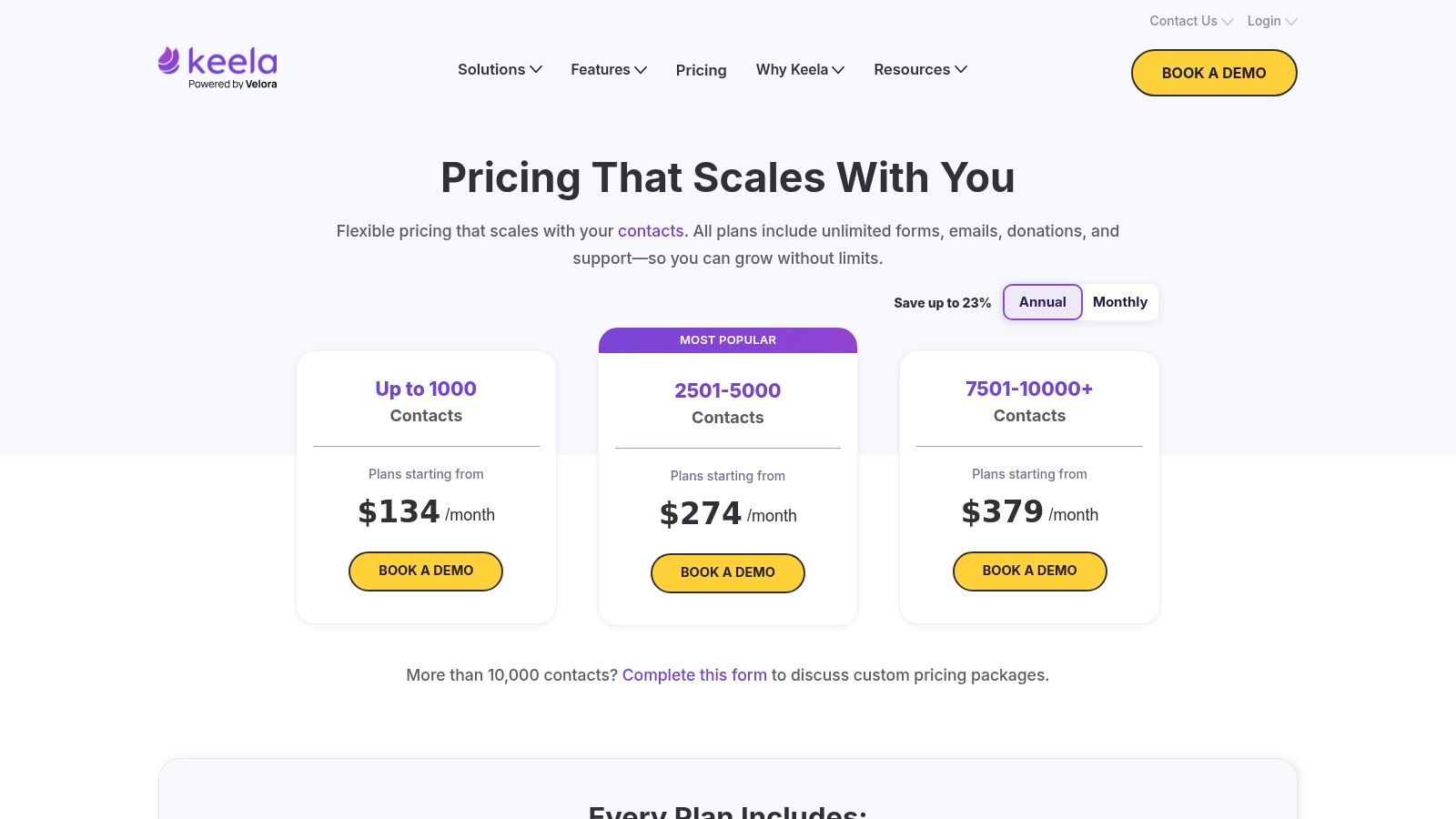
Key Features & Considerations
- Pricing: Plans are priced based on the number of contacts, with all tiers including core CRM and email marketing. Optional add-ons are available for features like peer-to-peer fundraising and project management.
- Best For: Small to mid-sized nonprofits that need an all-in-one solution combining donor management with built-in marketing automation and communication tools.
- Implementation: Keela is known for its strong onboarding support and extensive knowledge base, making it relatively easy for teams to get started without needing a dedicated IT administrator. Data residency options are also available for organizations in the US, UK, and Canada.
- Ecosystem: While its native feature set is robust, Keela has a smaller third-party app ecosystem compared to larger platforms. However, it offers key integrations through services like Zapier.
Website: https://www.keela.co/pricing
10. Virtuous
Virtuous is a modern nonprofit CRM built around the concept of "responsive fundraising," using data and automation to build personal donor relationships at scale. It moves beyond basic contact management to provide sophisticated tools for creating automated donor journeys, identifying major gift prospects, and analyzing fundraising effectiveness. This makes it one of the best CRM software for nonprofits that are outgrowing entry-level systems and need a more powerful, data-centric platform to fuel their growth. Its strength lies in combining marketing automation with deep fundraising intelligence.
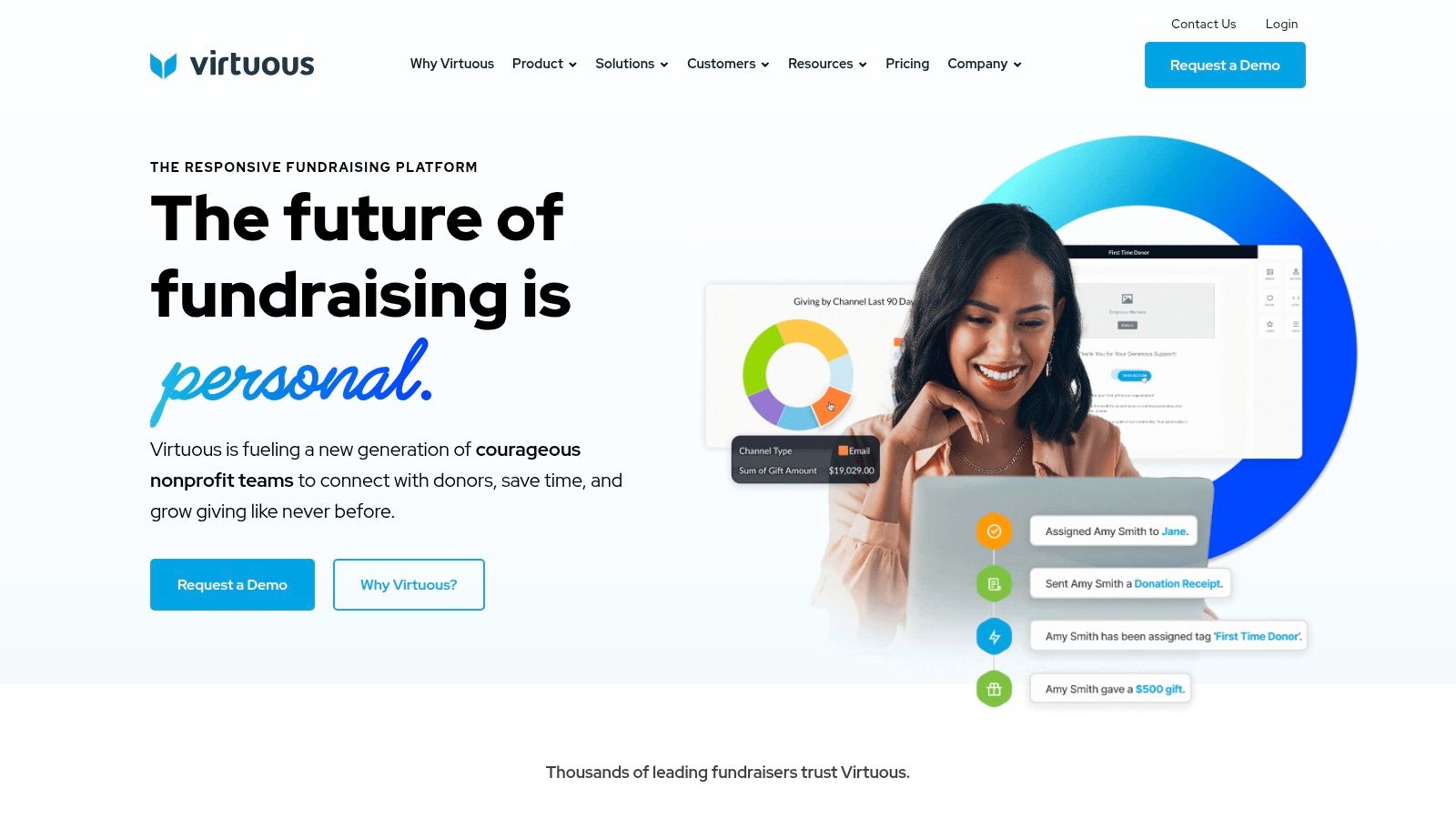
Key Features & Considerations
- Pricing: Pricing is customized based on contact volume and features. It is generally positioned for mid-market to enterprise nonprofits and is higher than entry-level tools.
- Best For: Growth-focused mid-sized to large organizations that want to implement sophisticated, automated donor journeys and leverage data to increase major gifts.
- Implementation: The platform is powerful and often benefits from professional services for data migration and workflow setup to maximize its responsive fundraising capabilities.
- Ecosystem: Virtuous offers integrated online giving, volunteer management, and marketing tools, providing a cohesive, all-in-one platform experience without relying on third-party apps.
Website: https://virtuous.org/
11. Salesforce AppExchange (Nonprofit Category)
While not a standalone CRM, the Salesforce AppExchange is an essential resource for any organization using the Salesforce platform. It's the official marketplace where nonprofits can find thousands of third-party applications and certified consultants to extend the functionality of their Salesforce instance. This ecosystem is a key reason why Salesforce is often considered one of the best CRM software for nonprofits, allowing you to add specialized tools for everything from event management and payment processing to sophisticated grantmaking.
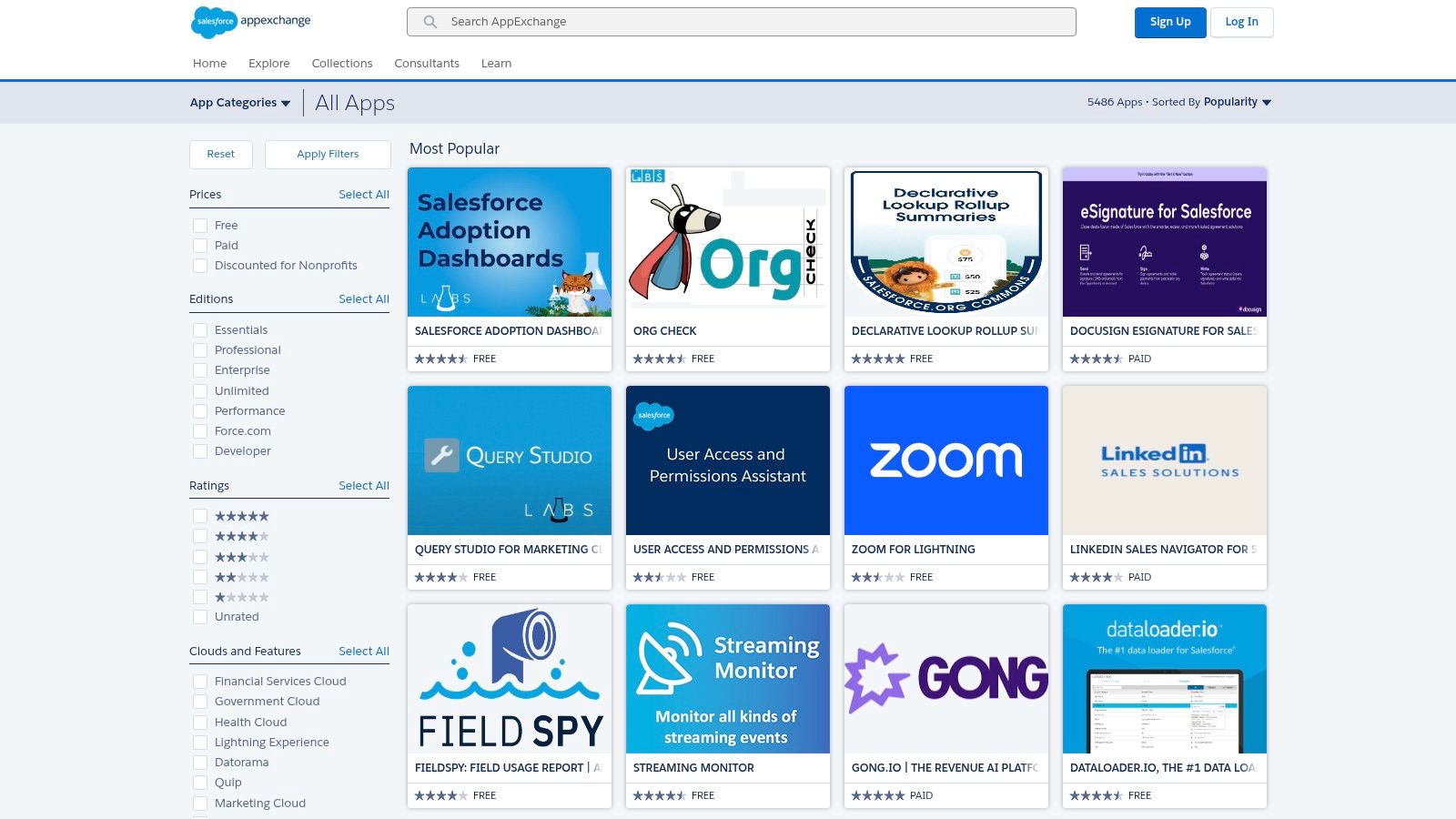
Key Features & Considerations
- Pricing: Varies widely. Many apps are free or offer significant nonprofit discounts, while others require separate subscriptions or one-time implementation fees.
- Best For: Nonprofits already using Salesforce who need to add specific capabilities or find expert implementation support without building custom solutions from scratch.
- Implementation: App installation can range from a simple click-to-install process to complex configurations requiring professional services from the app developer or a consultant.
- Ecosystem: The marketplace provides native integrations, ensuring that data flows seamlessly between the core CRM and the add-on tools. This is particularly valuable for specialized functions; for example, you can find a dedicated nonprofit grant management software that works directly within your Salesforce environment.
Website: https://appexchange.salesforce.com/industry/nonprofits
12. Capterra Nonprofit CRM Shortlist
Instead of a single platform, Capterra's Nonprofit CRM Shortlist is a powerful research hub that helps organizations compare the best crm software for nonprofits side-by-side. It serves as an excellent starting point, offering a curated, data-driven list based on user reviews and search trends. This resource allows you to filter potential solutions by features, budget, and organization size, making it an invaluable tool for creating your own vendor shortlist before committing to demos.
Key Features & Considerations
- Pricing: The resource is free to use. Pricing information for listed CRMs is often provided as a general range, but you must visit the vendor's site for exact quotes.
- Best For: Nonprofits in the initial research phase who need an unbiased overview of the market to discover and compare a wide range of CRM options.
- Implementation: Not applicable, as Capterra is a research directory. Once you select a vendor from their list, you will follow that specific software's implementation process.
- Ecosystem: The platform links directly to vendor websites, where you can explore their specific integrations, trial offers, and demos.
Website: https://www.capterra.com/nonprofit-crm-software/shortlist/
Top 12 Nonprofit CRM Comparison
Final Thoughts
Navigating the crowded landscape of nonprofit technology can feel overwhelming, but selecting the right Constituent Relationship Management (CRM) system is a foundational step toward amplifying your impact. As we've explored, the "best crm software for nonprofits" isn't a one-size-fits-all solution; it's the platform that aligns most closely with your organization's unique scale, budget, and strategic goals.
From the enterprise-level power of Salesforce Nonprofit Cloud and Blackbaud Raiser’s Edge NXT to the user-friendly, donor-centric design of Bloomerang and DonorPerfect, the options are as diverse as the missions they serve. Smaller, growing organizations might find the perfect balance of affordability and functionality in tools like Little Green Light or Keela, while those already integrated into the HubSpot or Microsoft ecosystems will find their nonprofit-specific offerings to be a seamless extension of their current operations.
Key Takeaways for Your Selection Process
Your journey to find the right CRM should be guided by a clear understanding of your needs. Remember these core principles as you move forward:
- Define Your "Must-Haves" vs. "Nice-to-Haves": Before you get dazzled by advanced features, create a prioritized list. Do you absolutely need sophisticated grant tracking, or is robust email automation the more pressing requirement? A clear list prevents you from overpaying for features you won't use.
- Total Cost of Ownership Matters: Look beyond the subscription fee. Factor in potential costs for implementation, data migration, user training, third-party integrations, and ongoing support. What seems cheap initially can become expensive over time.
- Prioritize User Adoption: The most powerful CRM is useless if your team won't use it. Consider the technical skill level of your staff during the evaluation. A simpler interface that gets used consistently is far more valuable than a complex system that gathers digital dust.
Your Actionable Next Steps
Feeling empowered to make a decision? Here’s how to proceed:
- Assemble Your Team: Involve key stakeholders from fundraising, programs, and marketing. Their diverse perspectives will ensure the chosen system meets everyone's needs.
- Shortlist and Demo: Based on our guide, select your top three to four contenders. Schedule live demos and come prepared with specific questions and scenarios relevant to your daily operations.
- Check References: Ask vendors for references from nonprofits of a similar size and focus. Hearing directly from a peer organization provides invaluable, honest insight into the real-world experience of using the software.
Ultimately, choosing the best crm software for nonprofits is an investment in your organization's future. It's about more than just managing data; it's about building stronger relationships, streamlining operations, and freeing up your team to focus on what truly matters: your mission. With careful consideration and a strategic approach, you can implement a system that will serve as the engine for your growth and success for years to come.
Is your nonprofit looking to supercharge its grant-seeking efforts? While your CRM manages donor relationships, Fundsprout uses AI to find your perfect grant opportunities and streamline the application process. Complement your new CRM with a powerful grant-finding tool by visiting Fundsprout to see how we can help you secure the funding your mission deserves.
Try 14 days free
Get started with Fundsprout so you can focus on what really matters.
